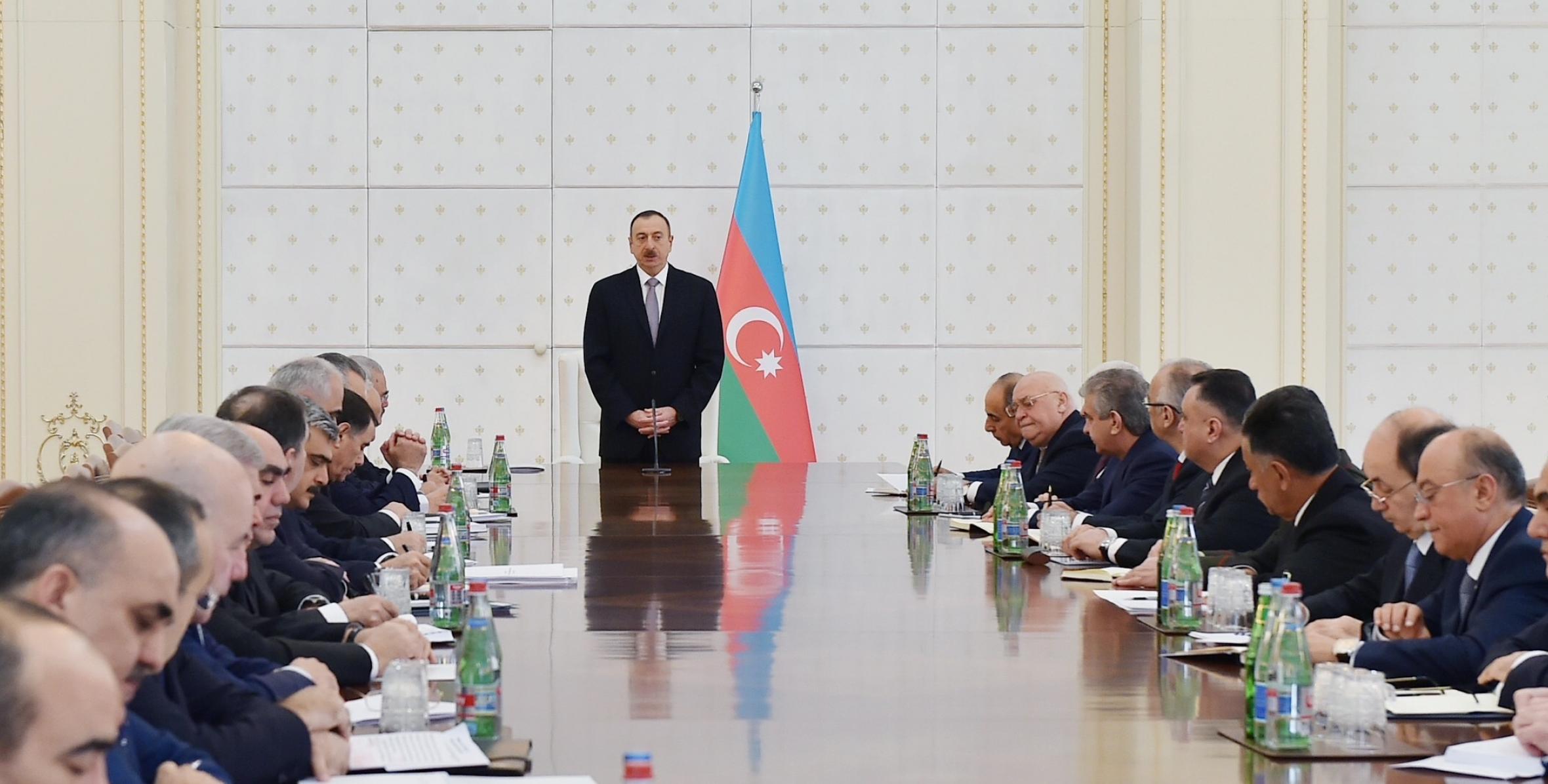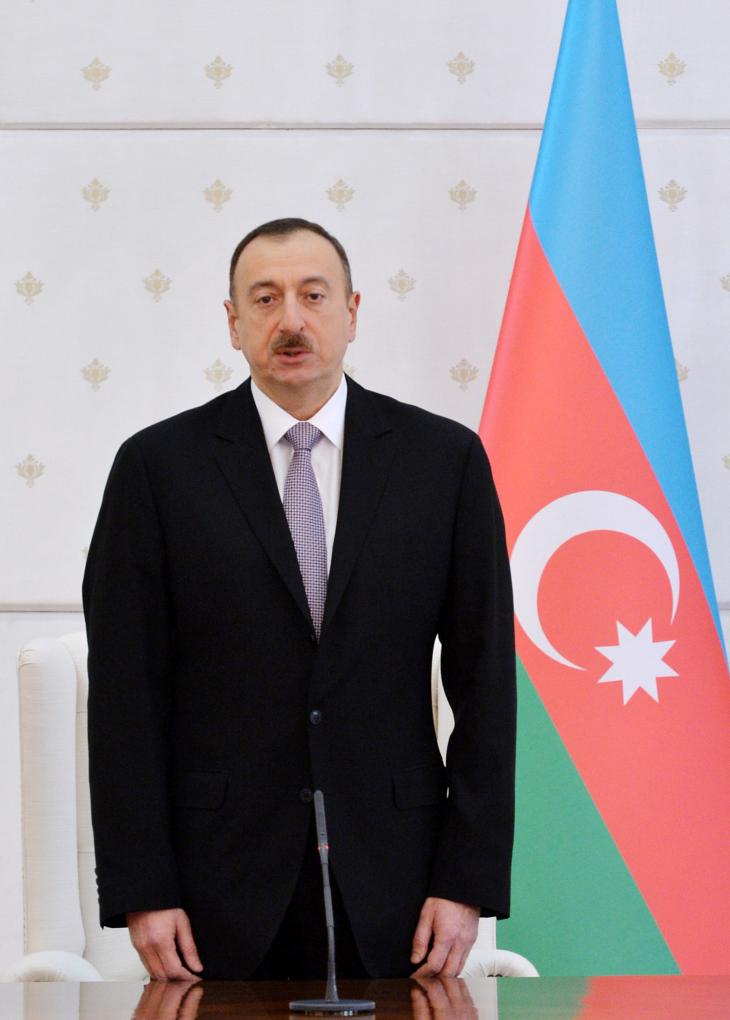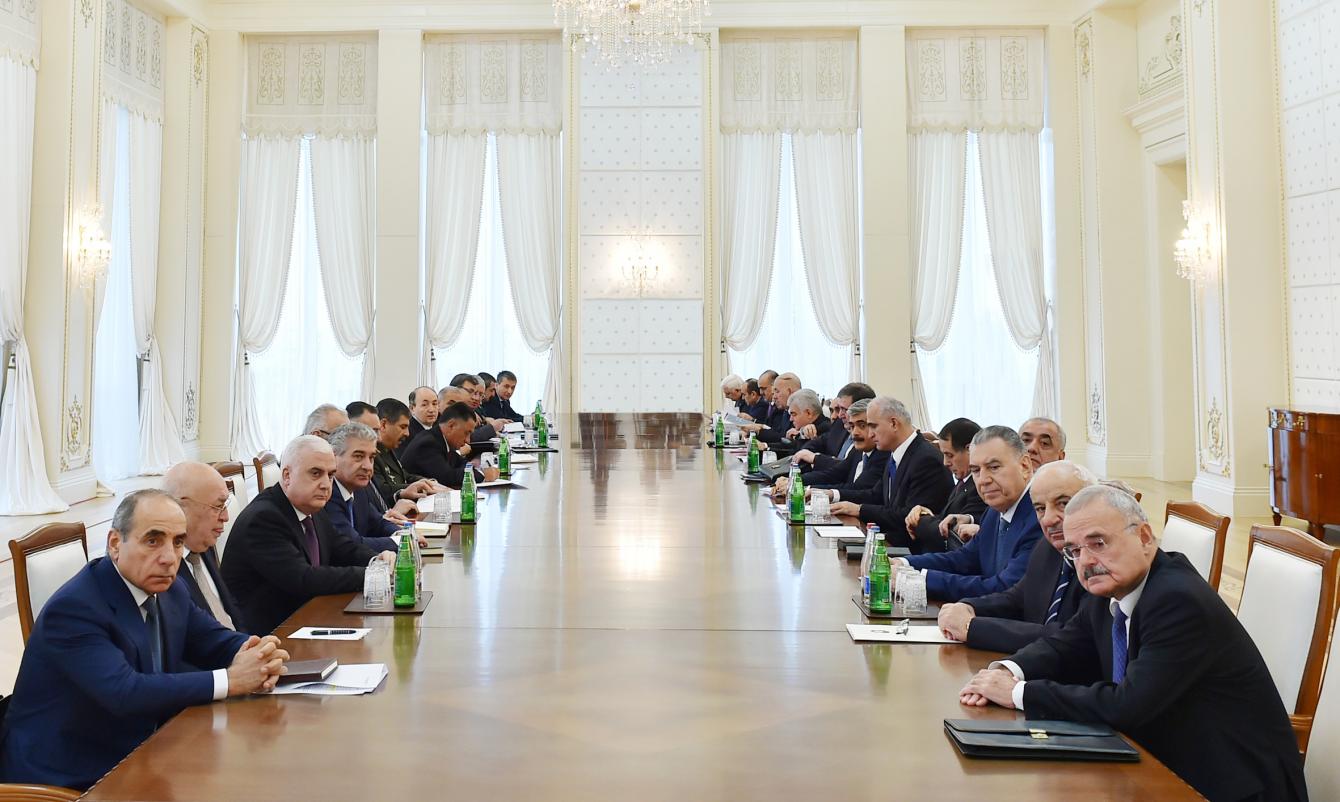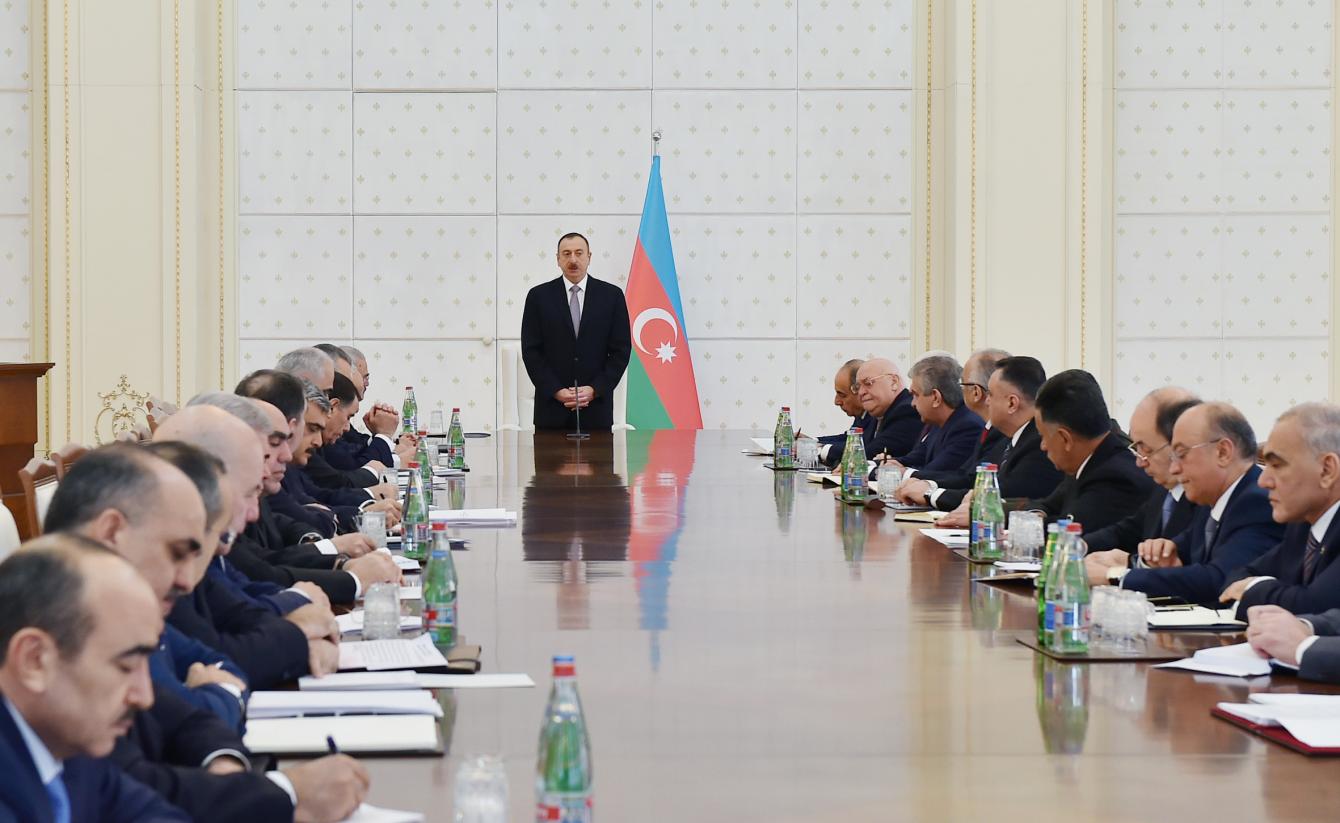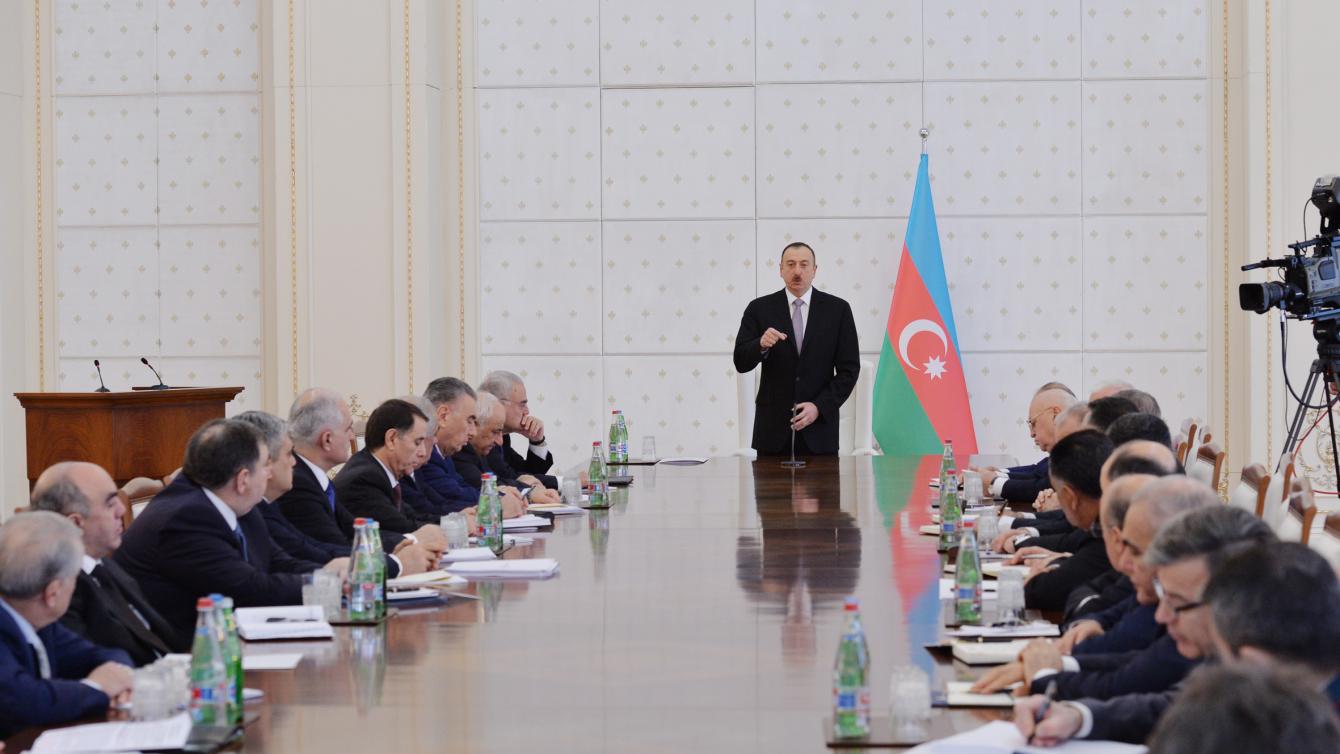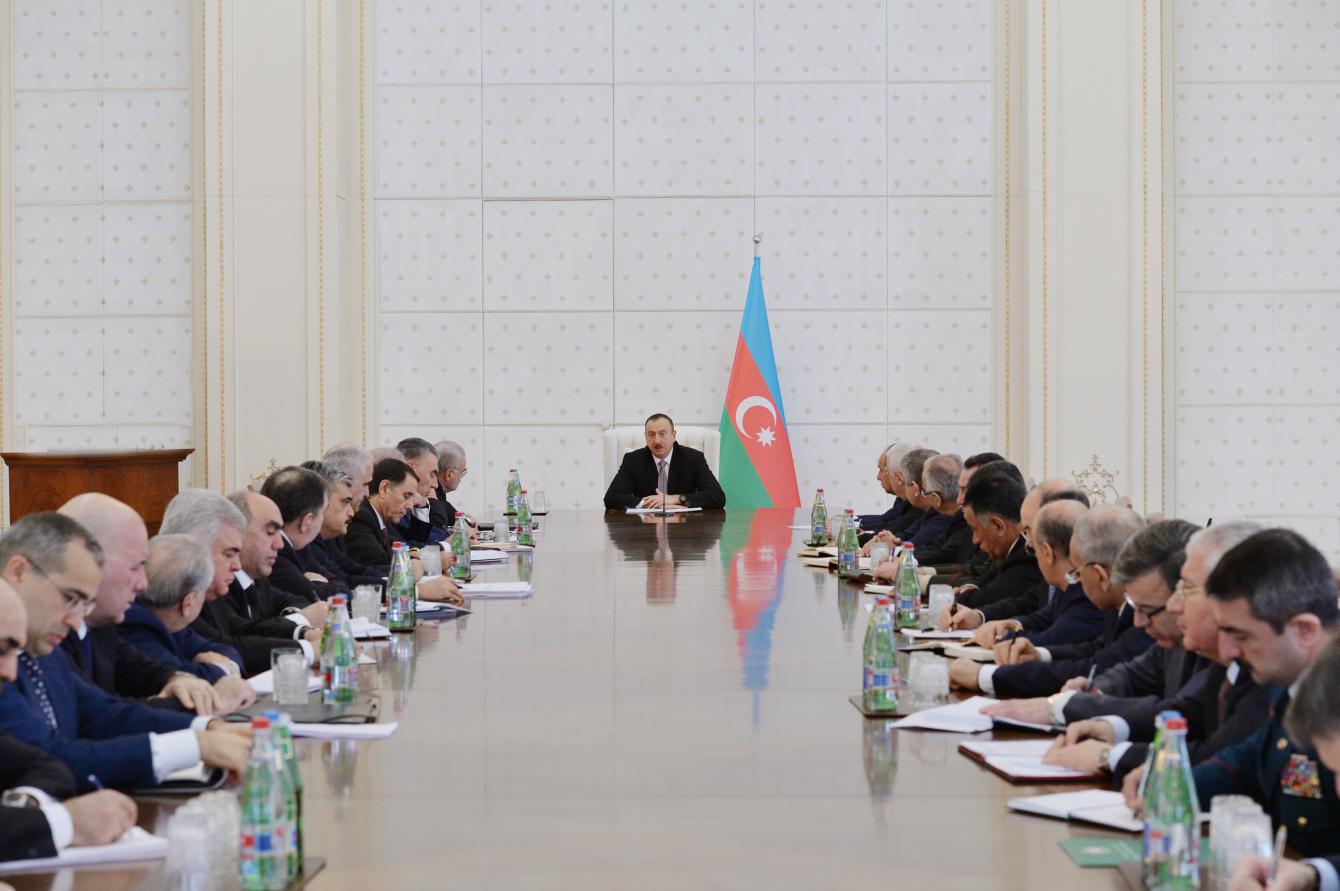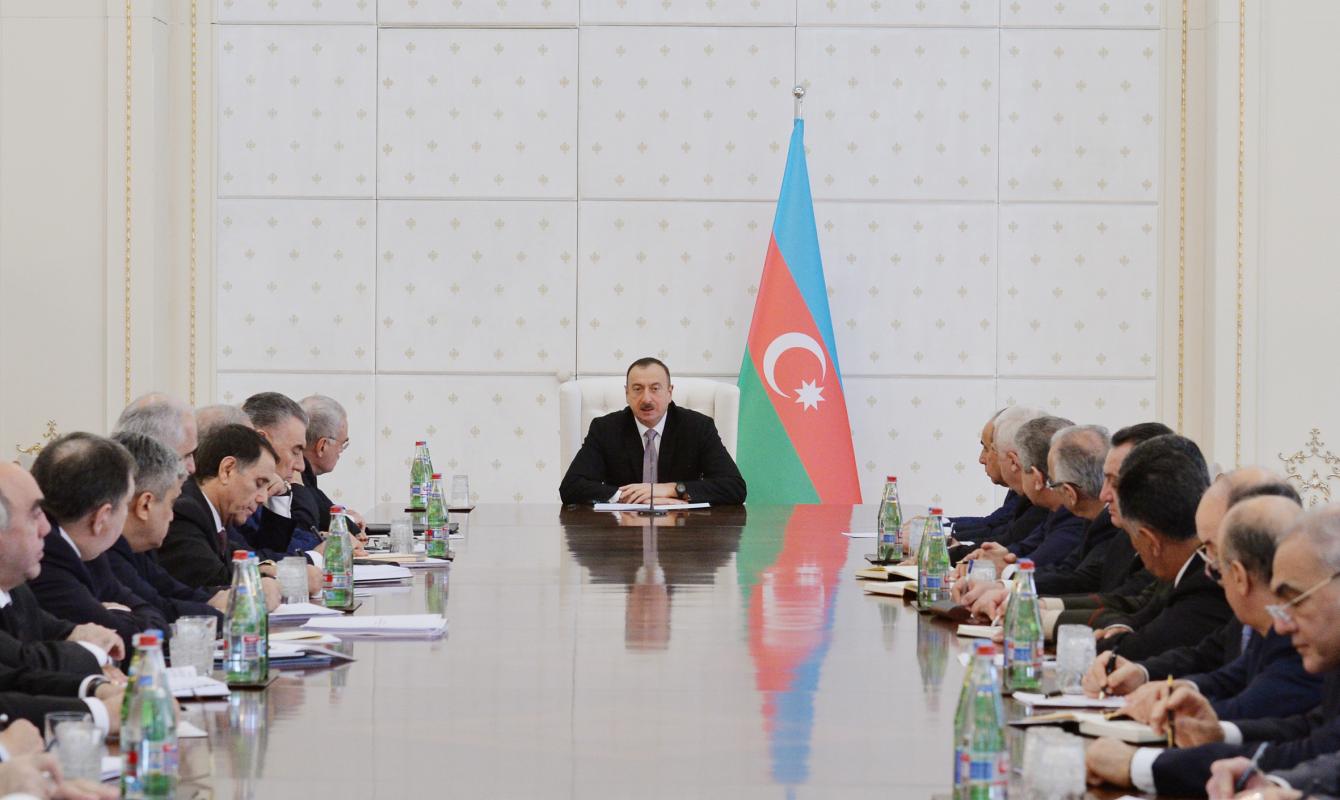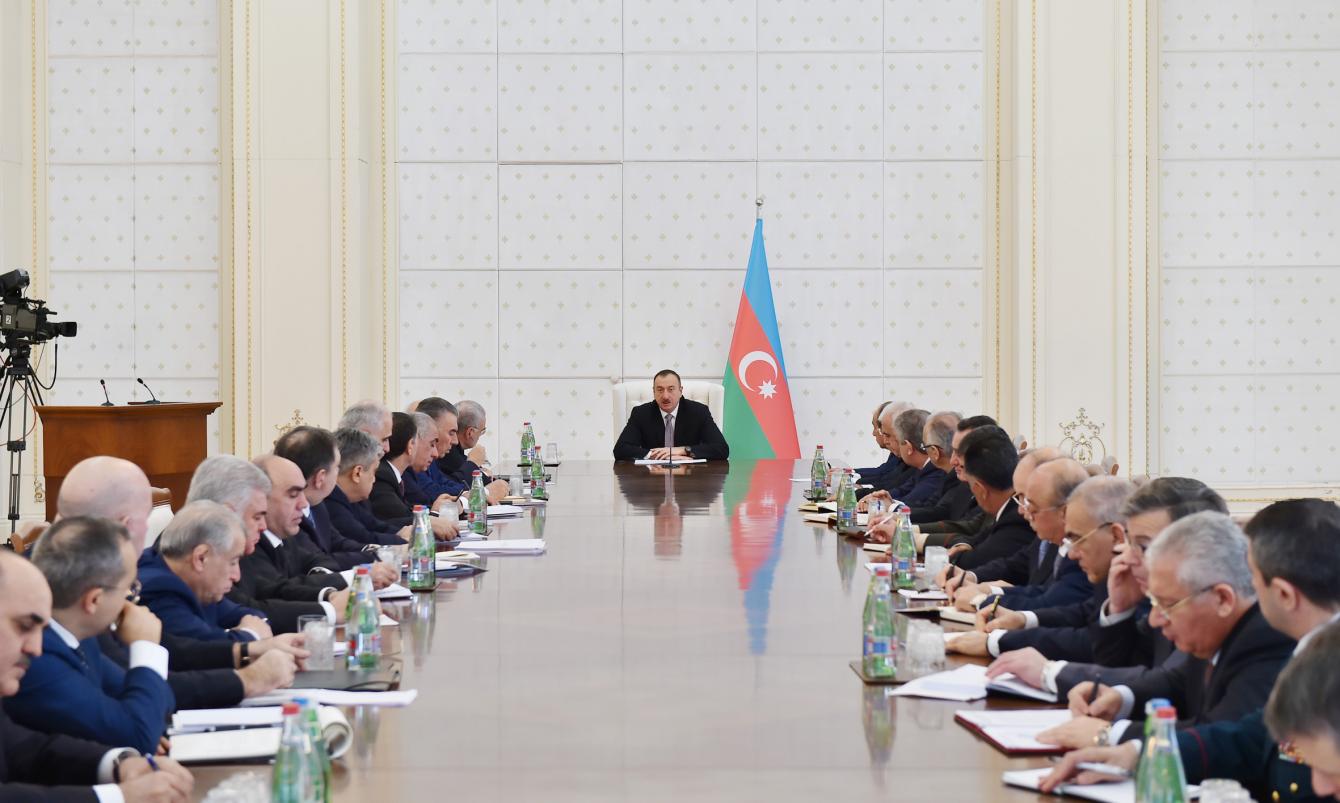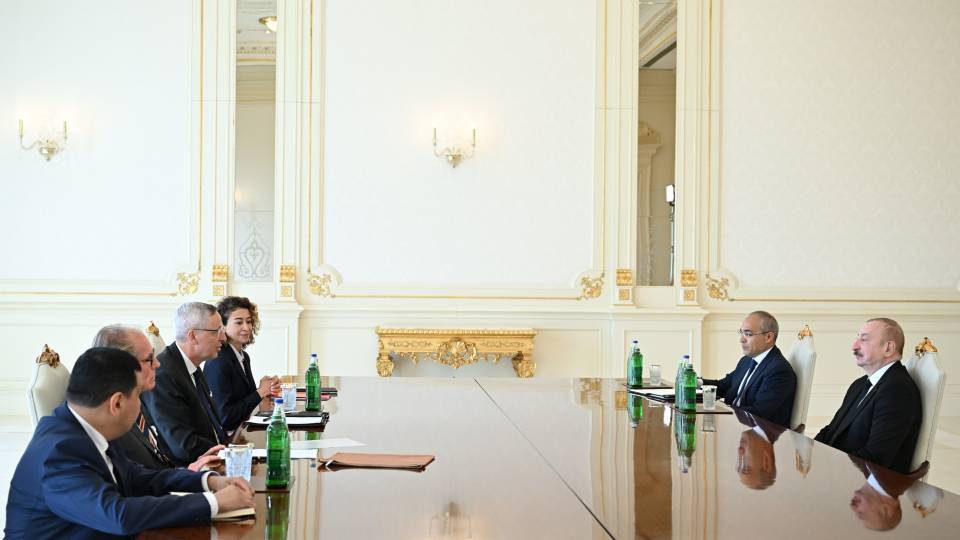President of the Republic of Azerbaijan Ilham Aliyev has chaired the meeting of the Cabinet of Ministers dedicated to the results of socioeconomic development in 2014 and objectives for 2015.
President Ilham Aliyev opened the meeting.
Opening speech of President of the Republic of Azerbaijan Ilham Aliyev
- Today we will discuss the results of 2014. I can say that all the objectives set at the beginning of last year have been successfully met. 2014 also goes down in history as a successful year for our country. Exactly a year ago we had an extensive exchange of views regarding the work to be done in the past year. We set important tasks and worked hard throughout the year. The world and the region witnessed different processes last year. We can say that tensions have significantly increased. However, Azerbaijan has managed to maintain a high pace of development. We provided for the security of our country and implemented economic and social programs. The Azerbaijani people lived in safety in 2014 as well.
This demonstrates once again that ours is the right path. Azerbaijan is going along the path of independence and development. The economic and financial crisis that gripped the world a few years ago, as well as the negative events and conflicts taking place in the region, did not affect the successful development of Azerbaijan. The main reason here is the stability of the sociopolitical situation in Azerbaijan, the unity between the people and the government and the successful implementation of all our programs. Azerbaijan’s foreign and domestic policies enjoy popular support, and I am confident that as a result of the work to be carried out this year Azerbaijan will grow even stronger.
The country's economy has developed successfully. At the beginning of last year we set the goal of achieving growth of both the gross domestic product and the non-oil sector. These two main objectives have been met. Our economy has grown by about 3 per cent. This is an excellent indicator in today's world. Some countries have not experienced any growth. In fact, they are registering a decline. In the countries registering growth it constitutes about 1 per cent.
Despite the fact that oil prices plummeted at the end of last year, the economy of Azerbaijan has increased by almost 3 percent. It is very delightful that our non-oil sector has increased by 7 per cent. This is a good example of the work carried out in the last few years and a manifestation of our policy. In the future, the non-oil sector will provide for even greater economic development of Azerbaijan. The development of the non-oil sector will enable us to achieve a diversified development of the economy and ensure its sustainable development.
Inflation was very low – 1.4 per cent. This is also a great indicator. Incomes of the population have increased by 4.8 per cent, exceeding the inflation rate more than three times. I can say that there has been a picture in recent years when population incomes grow several times faster than inflation. And this has a positive effect on people’s well-being.
The country's economy has received $27 billion in investments. Of these, $16 billion is domestic investment. This is also very gratifying. In recent years domestic investments have dominated the total volume of investments. At the same time, foreign investments in the amount of $11 billion show that Azerbaijan is an attractive country for foreign investors. Given the current environment and the extremely difficult situation observed in the world and the region, the attraction of foreign investments worth $11 billion is a great success.
This success, of course, is underpinned by the policies pursued in recent years. Without this policy and without the investor confidence in the stability and the future of Azerbaijan, no-one would have invested so much in Azerbaijan. The investment of $27 billion and the inflation of 1.4 per cent are the best indicators of the successful development of Azerbaijan because we have raised pensions, wages and incomes of the population. We have invested heavily but the inflation is still at its lowest.
The exchange rate of the manat remains stable. For several years, the rate of the manat has been not only stable, it has also increased in comparison with the major world currencies. We saw this in the past year as well. This is also a very positive indicator because the stability of the manat primarily favors the well-being and leads to an increased purchasing power of the population. The rate of the Azerbaijani manat is stable. This demonstrates the success of our economic policy again.
Our foreign exchange reserves have increased. I remember giving the instruction a year ago that despite the high expenditure in store for us in 2014 – the large costs associated with the implementation of infrastructure projects, our oil strategy, the construction of the Southern Gas Corridor – we still had to do our best for our currency reserves to increase further. We have achieved that! Our currency reserves exceed $50 billion now. We are using these opportunities efficiently. On the one hand, we are increasing our foreign exchange reserves every year, but on the other we are using these opportunities for sustainable progress of our country and investing heavily in the development of the economy and the implementation of infrastructure projects.
In short, our main economic indicators for 2014 are very positive. I can say that perhaps they are the highest in the world. In the past 11 years, Azerbaijan has been the fastest growing country in the world in terms of economic development. The population and our people are seeing that. Our developing country is graphic evidence of that. At the same time, this is acknowledged by influential international economic entities. According to the Davos World Economic Forum, the economy of Azerbaijan is ranked 38th in the world for competitiveness in 2014. So we are among top 40 competitive economies in the world. This is a historic achievement.
Of course, our strong economy and sound policies allow us the opportunity to pay attention to the social sphere. This area is a constant priority, and this will continue to be the case this year too. The construction of social facilities has been ensured. More than 60 medical centers and over 50 schools have been built and commissioned. Wages and pensions have been increased. The average monthly salary in Azerbaijan is approaching 600 dollars. We will try to make sure that these rates become even more dynamic every year. A total of 400,000 people, or more than 90,000 families, are receiving targeted social assistance from the state. The state provides each family with an average of 155 manats, or about $200, a month.
Of course, we must and will do that. But I am sure that as the well-being of our people improves, the number of people in need of targeted social assistance will decrease. Currently the rate of poverty in Azerbaijan is 5 per cent. Poverty has dropped further last year, while unemployment is under 5 per cent. These are the results of our work. These figures in themselves confirm our successful development.
Last year was declared "The Year of Industry" in Azerbaijan, as we established more than 230 industrial enterprises. A total of 123,000 jobs have been created, of which nearly 100,000 are permanent. This process should also go fast because there is still a need for jobs in Azerbaijan. We still have unemployment. At the same time, the rapid economic development has had a positive impact on the demographic situation. Last year the population of Azerbaijan increased by 116,000 people. So the creation of new jobs should be a continuous process. This is the case now, and additional measures will be taken in this direction this year.
Last year we implemented several major projects. Every project is significant in itself. Among them I want to emphasize the reconstruction of Heydar Aliyev International Airport. At the same time, we commissioned the ferry terminal of the Alat International Trade Seaport. So the first part of Phase I of this project has already been implemented. The Shamkirchay water reservoir has been commissioned. This is also an ambitious project that will give an impetus to the long-term and rapid development of our country. At the same time, we commissioned large industrial enterprises, including the “Norm” cement plant where cement production constitutes 2 million tons. By putting this plant into operation we have completely eliminated our dependence on imports and increased our export opportunities.
Of course, other projects are also worthy of attention. Such major infrastructure and industrial projects can be implemented only in a strong state. We are following the processes ongoing in the world. We can see that different regions of the world are faced with a crisis – economic, financial and political. Under such circumstances countries not just hold back investments. They are cutting wages and pensions and axing jobs. Despite this, we are seeing a completely different picture in Azerbaijan. If we consider the fact that Azerbaijan has long been integrated into the world economy and is part of the global economy, such a success, of course, requires great effort and long-term and judicious policies. We have achieved this in a systematic and profound manner. These results suggest that Azerbaijan will successfully develop in the coming years too.
Oil prices in the world dropped more than in half. Of course, this will have a negative impact on our revenues. But despite this, thanks to the ongoing and future work on diversifying the economy, institutional reforms and the application of even more effective methods of management, I am sure that Azerbaijan will come out of this situation with its head high, the rate of the manat will remain stable and economic development will be ensured.
Last year we put our second satellite into orbit. This is also a great event. This is a project that has a special place among large-scale projects. We already have two satellites now. One is a telecommunications satellite and the other is a satellite observing the Earth. This is very important. Space industry in Azerbaijan is developing fast. We invest in new technologies and innovative projects. These projects serve the development of science, improve governance and at the same time prevent the still existing negative phenomena in society.
I want to emphasize the opening of “ASAN xidmət” centers. There are already seven centers now. Over the course of two years they have received 3.5 million applications. The number of services provided is growing. Their quality is high and this is very positively perceived by society. Of the institutional projects against corruption and bribery carried out in recent years, “ASAN xidmət” is in the foreground, of course. Our experience is studied in other countries. We have purchased 10 new buses, so mobile services will be provided on an even larger geographical area. In other words, this service has brought about both novelty and comfort. It has also created a very serious watershed in the fight against corruption and bribery. Now there are even more opportunities for eliminating this scourge from a practical point of view. Besides, even more people treat these issues with optimism.
We want everything in Azerbaijan to be done at the highest level. The elimination of negative trends in the social policy, economic development and governance will, of course, complete this beautiful picture. Work in this area is carried out in a consistent manner. We have a very strong political will. Our initiatives are supported by the people and our intentions already manifest themselves in life.
Our international relations expanded further last year. Every year there is a growing number of countries we cooperate with. In other words, we cooperate actively. Azerbaijan pursues a very successful foreign policy both in bilateral and multilateral formats. Of course, in the bilateral format we had very close contacts, primarily with neighboring countries. Numerous mutual visits at the level of heads of state were organized. Work has been done on the development of bilateral relations with countries of Europe and Asia. Azerbaijan enjoys great respect in the world, is recognized as a reliable partner and our international authority is gradually increasing. Azerbaijan's role in the solution of regional matters and issues of regional cooperation is indispensable. We have put forward many initiatives. These initiatives are not just intentions. They are turned into tangible projects. The implementation of these projects, of course, enhances our capabilities and brings our country political and economic dividends.
Last year we cooperated successfully with international organizations. Azerbaijan takes an active part in all international organizations we are members of, defends his position and makes a valuable contribution to the successful activities of these organizations. Last year we chaired the Committee of Ministers of the Council of Europe. It was a period of very successful presidency. During this period Azerbaijan made a huge and valuable contribution to the development of democracy, protection of human rights and justice in Europe. In particular, our country's experience is associated with multiculturalism is unique. I believe that if our experience were analyzed more broadly in the world, it would be possible to prevent many negative facts.
In other words, with our work, the policies being implemented and the measures being taken Azerbaijan is making a valuable contribution to human values. We will continue to cooperate with international organizations. We promptly and completely fulfill our obligations to the organizations we are members of. At the same time, we have no and can’t have any obligations to the organizations we are not members of. Of course, in the bilateral format we can’t have any obligations to any state. These are governed by the laws of international relations. If someone believes that it is possible to dictate something to Azerbaijan in the language of ultimatums, they are mistaken. This is further evidenced by our history and the independent and bold policy we have carried out in recent years. All countries should build only equitable relations in the bilateral format. These are the rules of international conduct. No country has or can have exclusive rights. All countries are equal, and the organization uniting all countries is the United Nations. It is the organization which elected Azerbaijan to its highest structure in 2011. With the support of 155 countries Azerbaijan became a member of the UN Security Council. This is a great indicator reflecting the international authority of Azerbaijan. Attempts to tarnish, sully and belittle Azerbaijan, a country that enjoys great authority in the international arena today, are all in vain. They are completely futile and will never affect our policy. No outside force can speak to us in the language of ultimatums. Everyone should know this. We defend our position in all official statements and discussions held behind closed doors. We are far from double standards, and we believe that there is no room for double standards in international relations. These standards also work against those trying to apply them. We are seeing this from history and the developments unfolding in the world. Interference in internal affairs and coercion of someone into doing something – this does not benefit anyone. This violates stability, leads to bloody clashes in these countries and ultimately has a negative effect on those behind these bloody clashes. Today all countries of the world are connected to each other, and events taking place somewhere can reverberate elsewhere. I want to reiterate that our position is fair. It is based on international law. We have successfully defended and will defend this position.
As for the settlement of the Armenian-Azerbaijani Nagorno-Karabakh conflict, unfortunately there was no progress in this direction last year. Last year too, Armenia simply chose the strategy of imitating the negotiations. I believe that it is no longer a secret to us and the mediators that Armenia does not want peace. Armenia does not want this conflict to be settled and does not want to vacate the occupied lands despite the fact that the presidents of the OSCE Minsk Group co-chair countries have repeatedly stated that the status quo is unacceptable. But these are just words. These are just words that are not underpinned by a serious policy. If the status quo is unacceptable, and it certainly is, then measures must be taken. It is necessary to put pressure on the aggressor state. It must be forced to withdraw from the occupied lands. Otherwise, it will be some sort of hypocrisy. A statement is made but it is not followed by any work. Similarly, the UN Security Council has adopted four resolutions. For over 20 years none of them has been implemented. Why are some resolutions immediately implemented in other regions and are not implemented in our case? This is an injustice. These are double standards. The Azerbaijani people are already well aware that the unresolved status of this problem should not be attributed only to the unconstructive position of Armenia. Apparently there are forces in the world that are not interested in resolving this conflict. Apparently there are forces that are interested in keeping this conflict in a "frozen" or "semi-frozen" state and using it as a means of pressure on Azerbaijan. The picture we are seeing in different regions – Europe and the Middle East – in recent years further reinforces this position and this approach. This is the conclusion that follows from these processes. Therefore, it should be clarified how much longer we will have to encounter these double standards.
In addition, in the summer of last year and at the end of the year Armenia repeatedly resorted to an overt provocation. And on both occasions the Azerbaijani army gave the enemy a fitting rebuff and pointed it to its place. In the summer months more than 50 invaders were killed. In November, the Armenian provocation did not remain unanswered either. Responsibility for the events that occurred as a result of all these provocations rests squarely with the leadership of Armenia – the criminal and dictatorial regime. The current and previous leadership of this country is also directly responsible for today's deplorable situation in Armenia. It is because of their aggressive policy that Armenia has failed to assert itself as an independent country. In essence, it has not even achieved independence. This is simply a formality.
Azerbaijan sticks to a principled stand in this issue too. Our position is based on international law. Our position is reinforced by our army. Last year our army showed its power and what it is capable of. It showed the enemy and its patrons that the Azerbaijani army may restore its territorial integrity at any time. It would simply be better if this issue is resolved through negotiations. I believe that the presence of these several factors further strengthens our position.
Although no progress has been made in the negotiations, I believe that a lot was done to resolve the Armenian-Azerbaijani Nagorno-Karabakh conflict last year – both in political terms, within the regional frames, and in the military sphere – on the battlefield. We have taught the Armenians a lesson they still can’t recover from, are in disarray and hysteria. They are now trying to blame us at various international events. But the question arises: what are Armenian soldiers doing in Agdam and Fizuli? What is the Armenian army there for? Why doesn’t anyone apart from us openly tell them about this? Why are the mediators involved in the matter indifferent to this? These are rhetorical questions. We know why. Nevertheless, we have to ask these questions at every event and every forum. These questions should be asked by government officials, public figures, MPs, ordinary citizens and members of civil society. Let them answer the questions about the policy of double standards and pro-Armenian policies. It is becoming increasingly difficult to tolerate such hypocrisy. I believe it is no longer necessary to speak in the language of diplomacy. I want to repeat: the truth is that the continued occupation of our lands is not just the work of Armenia. Armenia is a powerless and poor country. It is in a helpless state. Of course, if it didn’t have major patrons in various capitals, the Nagorno-Karabakh conflict would have been resolved fairly long ago. Today this is acknowledged even by the Armenian leadership. Without the external support they would not be able to keep our lands under occupation even for a day. We are fighting alone. Our recent history has shown that even alone we can succeed in the political struggle and protect our national interests.
In 2015 we will further strengthen our army potential. Fairly large funds have been allocated for this purpose. Suffice it to say that the funds allocated for the military exceed the total budget of Armenia more than twice. Our army discipline and combat capability our growing. The patriotic spirits are at a high level. We are becoming stronger and Armenia is weakening. This is an inevitable process. So in the coming years this process will go even faster.
I want to reiterate that the results of 2014 and 2015 will show our strength again. Neither the fall in oil prices nor the crises and bloody clashes taking place nearby can affect our rapid development. I am absolutely sure that we will successfully complete 2015 and ensure the development of our country.
X X X
Minister of Economy and Industry Shahin Mustafayev, deputy Prime Minister, chairman of the State Committee for Refugees and IDP Affairs Ali Hasanov, chairman of the Central Bank Elman Rustamov highlighted socio-economic results of 2014 and objectives for the future.
President Ilham Aliyev made closing remarks. The head of state said processes that took place in 2014 show that this year will be very difficult for global economy. The President said that with the decline in oil price 2015 will be a test for countries rich in natural resources. “And a well thought-out economic policy, diversification process, unity between the people and authorities guarantees that this year too will be a success for our people. President Ilham Aliyev emphasized the importance of focusing on the development of the non-oil sector in 2015.
The head of state said allocation of preferential loans to entrepreneurs must be continued in 2015, management principles must be improved in all government bodies, the cases of squandering must be prevented. The President said that the implementation of economically and socially important projects, which are necessary for the country, will be continued.
President Ilham Aliyev hailed the groundbreaking of the Southern Gas Corridor last year as a historic event. “The execution of the Southern Gas Corridor, which is the project of the 21st century, will be an important stage in the development of our country.”
The head of state praised preparation for the first European Games to take place in Baku in several months, and said that the Organizing Committee is working actively. “The European Games standard will be set in Baku,” said the President, and hailed the games as “not only a sporting event, but also an important opportunity for sportsmen and guests to familiarize themselves with our country and development processes here”.
Closing speech of President of the Republic of Azerbaijan Ilham Aliyev
- The tasks facing the country in 2015 are known. We should strive to secure economic development. I am sure that it will be the case. But it is no secret that 2015 will be a very difficult year for the global economy. The processes observed at the end of 2014, of course, will be continued in 2015. The unstable economic situation in the world will continue for some time. The sharp drop in oil prices will, of course, be a test for countries rich in natural resources.
But the policies we carried out in previous years, the diversification, the sound economic reforms, the public and political stability, the unity between the people and the government, as well as our preparedness for crisis situations will, I am sure, allow us the opportunity to successfully complete 2015 as well.
The macroeconomic situation in Azerbaijan is stable. Among the top priorities in recent years we have always pointed to macroeconomic stability. It is important for the country's economy, a very important factor for attracting foreign investment. At the same time, macroeconomic stability is the most important contributor to the welfare of people, and we have secured economic stability over the years. We secured it in the crisis years of 2008-2009. We secured in the past year and we will secure it this year too.
The rate of the manat – as mentioned here – gives us opportunities to address many issues, primarily to enhance the confidence of foreign investors in the dynamic and successful development of our country and provides a quiet life for the population of Azerbaijan. The stability of the manat serves to improve peoples’ lives, and, of course, these factors are important for each country. For each country its national currency is one of the key attributes of independence. The manat is one of the most stable currencies in the world today. I think that if foreign nationals and companies keep their money in manats, they will not lose. The money will remain intact and bring them additional incomes. Many financial institutions of the world are not paying interest on deposits now. Deposits are simply stored as savings.
So I want to reiterate that Azerbaijan has long asserted itself as a part of the world. We are now open to the world, have an open economy, pursue an open policy, the open-door policy. For volume of direct foreign investment Azerbaijan has held a leading position in the region for many years. So we are a part of the global economy. Despite this, our sound policy and the commitment to protect our economy have, of course, contributed to this unique situation. We must protect this. 2015 will be an important year in this direction.
The second important task, and this has also been emphasized over several years, is the development of the non-oil sector. If we hadn’t taken important steps in this direction in good time, the current situation with the oil price could have a very negative effect. But today our non-oil sector is the driving force of the economy, and the non-oil sector growing at a rate of 7 per cent is the result of the work done. At the same time, it gives both investors and local companies additional optimism.
The population also sees and appreciates that. How have we achieved this? First of all, thanks to the implementation of the regional development program, enterprise development, provision of preferential loans to entrepreneurs, a thought-out policy, a policy of industrialization, attraction of foreign investments and the use of oil revenues in the right direction! All of these factors contribute to the development of the non-oil sector.
We are implementing infrastructure projects for the development of the non-oil sector. If these projects were not implemented, there would be no talk of business opportunities in the regions. At the same time, thanks to sound economic policies we have made the right priorities, and their order changes every year. This is natural because we are far from a dogmatic approach. We carry out a flexible economic policy. Increased production for the domestic market is also a factor directly influencing the non-oil sector development, and as a result of all this work and other activities we have ensured sustainable development. The non-oil sector dominates our gross domestic product. In the future, due to a decrease of the oil factor in our gross domestic product, the dependence of the economy on oil will become even smaller. This is our goal. I have always said and want to reiterate today that the oil and gas factor is only a means for us. It is a means of development, building a sustainable and diversified economy. We are effectively using this tool.
This year we will also provide loans to entrepreneurs on preferential terms. This initiative yields excellent results. We are getting convinced of that. This is evidenced by the new businesses and jobs in the regions. At the same time, the state provides great moral support to entrepreneurs. This work should be properly organized on the ground. I would like to recommend to entrepreneurs investing their funds in the real sector of our country this year to use their own funds. The state has provided entrepreneurs with great support for years. The volume of the loans granted on favorable terms accounts for hundreds of millions, perhaps over a billion. Entrepreneurs also need to use these opportunities and, at the same time, as they have accumulated some capital over the years, invest in the development of the country, in the development of the real sector of the economy. At the same time, we need to attract foreign investors to the non-oil sector. Of course, foreign investors are more interested in investing in the oil and gas sector, but we are and will be attracting them to other sectors too. As part of special programs we will create industrial and agricultural estates. All of this will serve to attract foreign investors as well.
On the one hand, the economic crisis is continuing in the world and there is a lack of funds, but on the other, there is not much choice for investment, because no-one wants to invest in countries in crisis. Therefore, it is much easier to attract investment to stable countries, to countries where there is political stability and economic development. A role here is played by a lack of information. However, the presentations and the business forums held in recent years, the communication of useful information about Azerbaijan to the international community, including the business people, have turned Azerbaijan into a very attractive country for investors.
This year, due to the development of the non-oil sector, the role of the banking sector is of particular importance. In recent years our banks have allocated the real sector of the economy a greater volume of loans. I support this, and in an earlier meeting I noted that this area should be given even more credits. We are already seeing that. This is a very positive approach, which demonstrates the responsibility of the banking sector.
I want to emphasize that 2015 will not be an easy year for the world. In 2015, the channeling of banking resources into the real sector of the economy will, of course, be a priority for us. I am sure that banks will continue to speak their word in this direction. Of course, it is necessary to allocate funds for various industrial loans and other projects. Shopping centers, office and residential buildings are under construction in Azerbaijan now. And this is natural because the country's economy is developing and people need such projects. This is also necessary. But the priority for the country's economy now is the funds invested in the real sector.
At the same time, our revenues will reduce this year, of course. Therefore, government agencies should act responsibly. We can’t allow waste. Of course, we will not give our consent to projects that are not a priority. At the same time, we should improve management principles in every state agency and state-owned company. We can’t allow waste. Our agencies should know the value of money. I am sure they are also aware of the situation and will make the right conclusions.
In recent years we spent a lot of money on the economy to ensure the rapid development of our country. I think it was the right policy. This policy provides for today's realities. The investment made in infrastructure projects and the real sector is paying off, and it is thanks to these funds that we can provide for overall economic development. In 2015, all the other projects needed for the country's economy and social sphere will, of course, be implemented in full. I want to say that all social programs will be implemented in full in 2015.
The targeted social assistance, the increasing incomes of the population, the construction of new settlements for internally displaced persons, the construction of homes – all of these programs will be provided. The construction of schools and hospitals will be continued. At the same time, we will implement infrastructure projects, especially projects related to drinking water. At the end of last year and early this year, we allocated significant funds from the Contingency Fund of the President in this direction. This year we will drill at least 300 artesian wells and set up modular water treatment plants in at least 50 villages. So funds for this purpose will be allocated from both the state budget and the Contingency Fund of the President. Among the infrastructure projects, drinking water projects are now a priority for us, and so are rural roads. Last year, a lot of money was allocated for the construction of rural roads. These figures were announced today and this process will be continued in the current year. In accordance with the order I have recently signed, everyone can see that we will continue our policy in this area.
The process of gasification, repair and laying of power lines is under way. These infrastructure projects and land reclamation measures are very important for our country because in 2013 and 2014 we completed two major projects – the construction of the Shamkirchay and Takhtakorpu water reservoirs. These projects hold a very important place in the history of Azerbaijan. We have realized these projects only in the years of independence and they demonstrate once again how strong the state of Azerbaijan is.
In continuation of these projects, we should build canals and put new acreage into circulation. Therefore, land reclamation activities will remain a priority. These projects are directly related to food security. We saw last year too that our plans related to food security were identified and implemented in a timely manner because food security is as important for any country as energy security. Of course, although Azerbaijan imports some food products from foreign markets, we need to try to maximize domestic production and protect ourselves from emergencies. We saw last year that some countries introduced bans on the exports of a number of foods. Therefore, in the interests of self-sufficiency we will continue supplying the domestic market using domestic resources.
The government provides farmers with support here too. As you know, tax breaks have been applied for many years. The state acquires equipment and purebred cattle. For food security reasons we have carried out institutional reforms, established agricultural estates and improved the process of granting subsidies. It is also very important to improve productivity. One of the items on our agenda relates to the growth of our export potential because I am sure that in the near future we will provide ourselves with all basic foodstuffs. Thus, we will have new products to export. If we consider the fact that we are already in the process of setting up about 20 large farms, I am sure that we will be able to fully provide ourselves with wheat in the near future. The productivity of new large farms will be twice the average – 55 quintals per hectare. The country average is 23 quintals. So this new modern approach and, of course, the new opportunities created by public funds will increase our export opportunities in the future, because the government has assumed the main function again. Places have been identified. Farmers have received loans on concessional terms. At the same time, we provide equipment and irrigation. The government has implemented all infrastructure projects in order to improve productivity, so that we could provide ourselves with food to the maximum extent.
Of course, the operation of the Shamkirchay and Takhtakorpu reservoirs is expected to result in the cultivation of new products on tens of thousands of hectares. These places have already been identified, and the process of growing products on these new areas is now starting.
Last year was declared the "Year of Industry". We took many measures associated with the development of industry. I noted in previous meetings that each district should have an industrial zone. A pilot project is already under way. Perhaps this year we will see the start of this project. At the same time, our traditional industrial centers are also expanding their capabilities. Sumgayit, Ganja, Mingachevir and, of course, the city of Baku, especially Garadagh District, are our main industrial centers.
This year we expect to set up a large metallurgical complex. Work on this complex has been under way for some time now. Foreign consultants have been engaged. We can say that the feasibility study is now ready. We have natural resources and ore deposits. Of course, we must strive to make the most of our natural resources to produce finished products on our own. This is our primary goal. In every industry we should be able to produce finished products. This is a project that requires major public funds. Although our revenues will decline now, I believe that this project is a priority for the development of our industry and will help create thousands of jobs. Thus, Azerbaijan will have new products to export, and this will give a further impetus to the economic diversification and development of the non-oil sector. Therefore, there should be no delays in this project. This issue is reflected in the State Investment Program.
The State Investment Program for this year, of course, is different from the programs of previous years because the funds invested by the state will be reduced. And this is natural. But the priorities are correct, and the implementation of the many projects in previous years allows us the opportunity to reduce this investment program. The Takhtakorpu and Shamkirchay are huge projects that required major public funds. Many projects on rural roads and drinking water have already been implemented. But there are priorities, and we should channel public investments into sustainable development because if we don’t do this, there will be emptiness in a few years. We can’t let that happen because, first of all, we should ensure sustainable development of the country. At the same time, job creation is an ongoing process.
In my opening speech I talked about it and want to say again. Some countries are experiencing a demographic crisis. Of course, the worst crisis is a demographic one. The population of some countries is sharply reducing due to natural causes. At the same time, countries are faced with extensive migration. Azerbaijan’s population is growing. It is our great advantage. The bigger the population of Azerbaijan, the stronger we are. But population growth brings with it some problems, including unemployment. Therefore, no matter how many jobs we may create, the need for job creation is always there.
Since the beginning of the state program – from 2004 to the present time – we have created 1,300,000 jobs. By this we have managed to reduce unemployment. But this process should be permanent. To ensure this, we need to create new industrial enterprises. If we consider that there is rapid scientific and technological progress at the present time, all processes are improving and becoming automated, there won’t be a huge need for manpower in the future. Therefore, preference should be given to innovation. We should also ensure the establishment of industrial parks, attract foreign technology and foreign investment. We are already investing public funds, but the state can’t invest a lot in the real sector. This is not right – we can only invest in the establishment of strategic industrial sectors. Therefore, we will continue to pursue a very serious policy in this direction in order to ensure the right process of industrialization.
Issues related to the environment are still a priority. Last year about 4 million trees were planted in Azerbaijan. This is a very positive fact. This process is under way both in the Absheron Peninsula and in all our regions. Oil-polluted areas are being cleaned. At the same time, drinking water and other projects also serve to improve the environmental situation. Work is well under way on Lake Boyukshor. After a few months we will complete the first stage of cleaning Lake Boyukshor. I believe that it will serve as an example for all other similar projects because we are working hard in this area, cleaning all areas, water basins contaminated with oil. Bibiheybat, the White City and Boyukshor. This year we plan to clean Lake Zikh. This is also a very important project. We are gradually cleaning all of the lakes around Baku contaminated with oil and produced water. There will be recreation, entertainment and public places there. In general, numerous public spaces, parks and squares have recently been created in Baku. For the number of such places Baku is perhaps in one of the leading places in the world. Baku is a city of parks and squares today, so Baku will also become a city of clean lakes. I am sure of that. I believe that the completion of the first stage of the cleaning of Lake Boyukshor by the summer of this year will show everyone what we can do. Where there is a strong will, any project can be implemented.
Last year we successfully carried out work related to transport. I have already noted that this year we will continue the construction of a new commercial seaport in Alat. The construction of the Baku-Tbilisi-Kars railway is drawing to a close. It is now being tested. From the Azerbaijani side almost all of the work has been done. I do hope that construction and installation work on all other sites will be completed this year and we will celebrate the opening of this project. This is also a historic project. There were years of negotiations and discussions around this project, but only after Azerbaijan invested its funds and asserted its will did the implementation of the project start.
Other projects related to transportation are also being implemented. New liners are being delivered to our country. Azerbaijan has become the first country in the CIS where two “Boeing-787 Dreamliner” aircraft have been delivered. Modern airliners were also acquired in the previous periods. New routes are being opened. Air transport is important for every country. Thanks to both cargo and passenger transportation, Azerbaijan has become a regional hub in this area. We must further enhance our role in this. Our geographical location should be underpinned by a powerful transport infrastructure. The construction of the commercial seaport and the construction of the Baku-Tbilisi-Kars railway are projects closely related to each other. We must expand these corridors. The North-South and East-West corridors pass through Azerbaijan. The transport infrastructure emerging in Azerbaijan will serve both our country and our neighbors.
Work is under way in respect of the Caspian Shipping Company. Reforms are carried out and new ships purchased. Most importantly, the shipyard in Azerbaijan already produces ships. Orders have been placed for oil and gas operations. Ships will be built for military purposes. At the same time, all other vessels such as tankers and cargo ships will be produced in Baku. This is also a result of our industrialization policy. The decision to build the shipyard has already paid off. We could see that all the ships – tankers, cargo ships, supply vessels – were purchased abroad. But we have internal needs. We need to expand our fleet. At the same time, we are implementing and will continue to implement major oil and gas operations. Due to the "Shah Deniz" field there is a need for new ships. Therefore, the construction of a shipyard in such a short time has been an important step. This plant can provide services to all littoral states. During conversations with my colleagues at the Caspian summit, I said: Such a plant is already available, and you can also use it and place orders. Generally, we can work even more closely in this direction in the Caspian Sea basin. If, for example, Baku has such a modern plant, I do not believe that the construction of such a plant may be required elsewhere. So there should be proper cooperation here. And Azerbaijan is speaking its word.
Last year, we laid the foundation for the Southern Gas Corridor. This is a historic event. This project will further accelerate our long-term development. This project is equivalent to the "Contract of the Century". This project is now known as "Project of the 21st century". It is quite symbolic that on 20 September 2014 – exactly 20 years after the signing of the "Contract of the Century" – the foundation for the Southern Gas Corridor was laid. The successful implementation of the oil strategy of great leader Heydar Aliyev is being provided today. See how much work has been done since the signing of the "Contract of the Century"! Baku-Tbilisi-Ceyhan, Baku-Tbilisi-Erzurum, the Southern Gas Corridor, the development of the Shah Deniz field. Azerbaijan has reasserted its leading role here. The author of the Southern Gas Corridor is Azerbaijan. The driving force behind this project is also Azerbaijan. This should be known to all. If it hadn’t been for the strong will of Azerbaijan, this project would never have been realized. We have done very hard work in connection with the implementation of this project. We worked very hard and have already begun to implement this project. We have secured that on the most favorable terms for Azerbaijan and within the framework of international cooperation because it is impossible to implement this project without our partners. Therefore, this project requires even greater coordination because it involves a lot of countries and companies. The Baku-Tbilisi-Ceyhan project involved three countries – Azerbaijan, Georgia and Turkey. The implementation of the Southern Gas Corridor will involve about 10 countries. We view this project as being very large and wide, and, of course, we divide it into stages. First of all, the expansion of the Baku-Tbilisi-Erzurum gas pipeline, the TANAP and TAP projects and, at a later stage, other projects. Therefore, it is a historic event. Azerbaijan has shown leadership in this area too.
Political and economic interests of our country will be secured. Azerbaijan is becoming an indispensable country for European consumers. What does this mean? There is no need for a long explanation. We are playing a role in the energy security of Europe. This role will gradually increase, as Azerbaijan is the only new source of gas for Europe. All other sources are already there. The reserves of these sources can be transported to Europe via different, i.e. new routes. Such projects are available, but there is only one new source – the Caspian basin and Azerbaijan. We have assumed this responsibility. I am confident that we will successfully implement this project because there has not been a single project that we have started but not managed to implement. This includes Baku-Tbilisi-Ceyhan, Baku-Tbilisi-Erzurum and Baku-Tbilisi-Kars, i.e. international projects. I am sure that the Southern Gas Corridor will also be fully implemented.
Baku will host the first European Games. The Games are five months away. The organizing committee works hard and meets all the objectives. All state agencies take an active part in this. Currently, preparations are in the final stages. We intend to hold the European Games at the level of Summer Olympic Games. These games should become a European holiday. Azerbaijan is again demonstrating its leadership because the standards of European Games will be established in Baku. Such games have never been conducted before. These games could be conducted at a different level but we want to turn this major sporting event into a grand celebration of friendship. It is very necessary.
The role of Azerbaijan is gradually increasing. The public and political situation in our country, the multiculturalism, the religious and ethnic tolerance and our openness to the world – all of these factors are important to Europe and the world today. In real life, we, unfortunately, often see a completely different picture – bloody conflicts, terrorism, hatred, double standards and so forth.
Azerbaijan offers its own model of development. This model is open to all. The economic model – we talked about it today. So it is a unique model of economic development. A model of political reforms. I think that Azerbaijan can serve as an example because by conducting economic reforms we also attach great importance to political reforms. We have created all democratic institutions and provided all freedoms – the freedom of speech, the freedom of assembly, the freedom of conscience, the freedom of the press, the freedom of the Internet, the freedom of religion. These freedoms are not only provided, they are also a way of life, a public policy. Therefore, the European Games are not just a sporting event. I believe that the athletes and visitors who will participate in this event will, of course, get acquainted with Azerbaijan and see the model of successful development of Azerbaijan.
If all countries dealt with their own affairs, did not interfere in the internal affairs of other countries and did not put forward unreasonable demands, the world would be more stable and security would be provided. We in Azerbaijan are doing and will continue to do this work, and I am sure that we will successfully complete 2015. Thank you.

